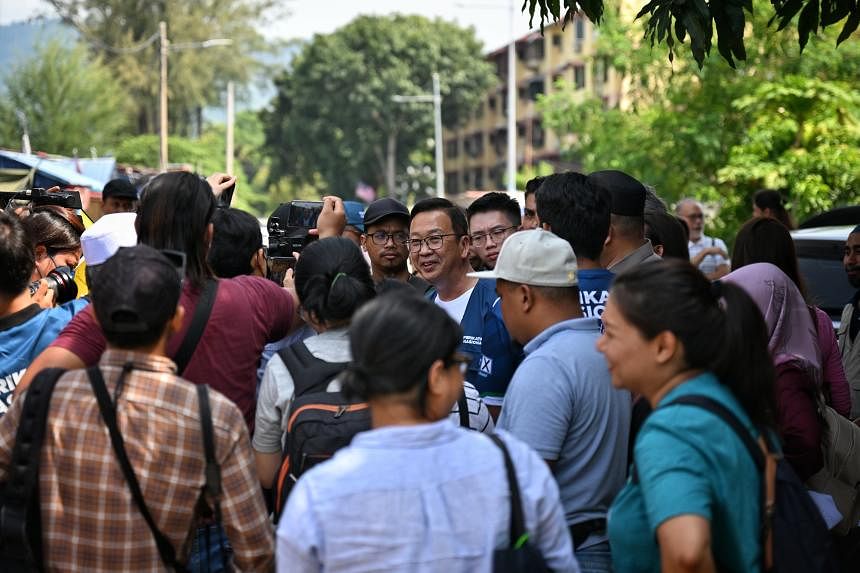GEORGE TOWN - Parti Gerakan Rakyat Malaysia’s campaign in the Penang state polls has got off to a faltering start after being boycotted by its opposition ally, Parti Islam SeMalaysia (PAS), which chose instead to focus on its own party candidates.
Last week, PAS leaders refused to attend an event to launch the candidacy of Gerakan president Dominic Lau for the Bayan Lepas seat, apparently to protest against the decision for him to run in the Malay-majority seat that has been traditionally contested by PAS.
“Right now, every candidate needs to bring their own machinery with them. Likewise, Lau has to bring his own people. We don’t have enough (members to help campaign),” state PAS chief Fauzi Yusoff told Malay daily Utusan Malaysia on Saturday.
Both Gerakan and PAS are members of the opposition alliance Perikatan Nasional (PN), together with Parti Pribumi Bersatu Malaysia. PN is hoping to overcome its portrayal by rivals as a conservative Malay-Muslim coalition in order to make inroads in the ethnically diverse Pakatan Harapan (PH)-held state at the election on Aug 12.
Gerakan is the only party in PN that is not dominated by the majority Malay-Muslim community, making it the flag-bearer for the alliance’s multicultural charge in Penang.
Bersatu leader Azmin Ali, who is PN’s chief minister candidate for Selangor, said: “We are not representing any particular race. PN is a multiracial coalition and PN will represent all Malaysians, regardless of race, religion and political ideology.”
But Gerakan’s efforts to convince voters in Penang – made up of 45 per cent Malays, 45 per cent Chinese and 10 per cent Indians – that PN is not pushing hardline Malay nationalism and an Islamic agenda are flailing after the PAS snub.
This comes even as PAS has fielded three non-Muslim candidates in Penang, while its ally Bersatu is fielding four.
Collectively, PAS is contesting 10 seats in Penang, and Bersatu 11, while Gerakan is contesting 19 seats in the 40-strong state assembly. Before the assembly was dissolved, the ruling alliance of PH and Umno-led Barisan Nasional had 35 seats, and PN had one seat via PAS. Four seats were vacated earlier after four assemblymen from PH joined Bersatu.
Mr Lau’s campaign is assisted by members from his own party and Bersatu. His stand-off with PAS continues, reflecting ongoing tensions between the parties that could scupper their chances in Penang.
Last week, he was asked to leave a rally attended by PAS president Hadi Awang, prompting PAS secretary-general Takiyuddin Hassan to apologise to Mr Lau days later for the poor treatment. Datuk Takiyuddin told PAS members to “extend a helping hand” to Mr Lau.
At a small “ceramah kelompok” – smaller gatherings in housing estates – last Friday night, Mr Lau held his first open rally since campaigning started on July 29. There were about 30 people present, nearly all of them PN supporters.
Mr Muhd Syahiran Shamsudin, a PAS youth member from a local branch, said grassroot members invited Mr Lau to campaign in their area on their own initiative, without any directive from senior leaders.
“We support him as he is the PN candidate, and we will help him in his campaign in our area,” he said.
Still, PAS has been much more supportive of its own non-Malay candidates.
Hustings for Mr Andrew Teow Chin Siang, who is contesting in his maiden election in the Chinese-majority seat of Sungai Puyu on the Penang mainland, are a clear example. Volunteers from PAS arrange his schedule, accompany him on walkabouts, distribute his campaign pamphlets, and wave the PN flags.
“I am Buddhist but my campaign volunteers are Muslims, and this shows PAS and PN are not extremist as some quarters claimed,” he said.
In its heyday, Gerakan was a major party in Penang, with its presidents holding the Penang chief minister’s post for a total of 39 years, from 1969 to early 2008, and holding Cabinet positions.
Its best electoral result was in the 2004 General Election when it won 10 parliamentary seats and 30 state seats. It currently has no seats in Parliament or any state assemblies.
Despite Gerakan’s slow start in the state polls, analysts say the party will remain relevant.
BowerGroupAsia political analyst Adib Zalkapli said it will not be the end for Gerakan if it fares badly in the state elections, as Bersatu and PAS need Gerakan to make PN a multiracial coalition.
“PN needs Chinese representation to be a legitimate political coalition and Gerakan provides the Chinese representation. Gerakan will still be around at least for the next few years,” he said.


